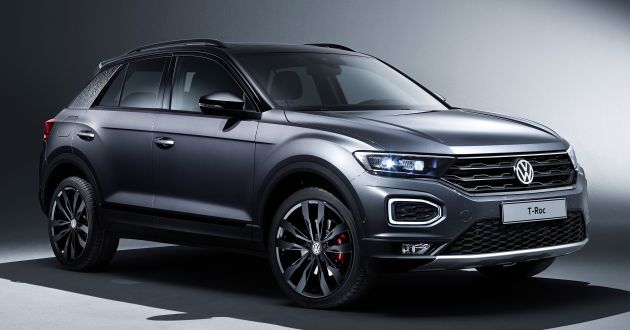Subsequent to the launch of the facelifted Arteon, Volkswagen Passenger Cars Malaysia (VPCM) invited us to a virtual press conference with managing director Erik Winter and other company personnel. In it, Winter explained in broad strokes the company’s plans for the future, including hints of upcoming models.
Firstly, the executive talked about the Arteon itself, the demand of which he said was very high. The decision to bring in the refreshed version in a higher spec (and price) was made to create “a distinction between the Passat lineup and the Arteon lineup,” he added.
Despite the previously close positioning of the two nameplates, Winter said the Arteon did not cannibalise sales of the Passat. “When we compared sales figures from the past and sales figures from the time when the Arteon was launched, we didn’t see any significant drop in the Passat,” he said. “I believe that the Arteon is an enrichment to the whole lineup and and boosted even further the image of the Passat.”
Then we got to the elephant in the room. Asked why the facelifted Arteon still did not offer autonomous emergency braking, Winter explained: “Getting those systems into the market comes with quite some research and development, testing as well as permissions. This is something we are working on and I definitely expect that one day, we will be able to launch this as well in Malaysia.”
Like all car companies here, VPCM was deeply affected by the tightened movement control order protocols currently in effect, as it also assembles vehicles locally. “Actually, the year started quite OK for us, the first couple of months were promising. Of course, we are now all affected by the different MCO statuses that we have, especially in the Klang Valley and our dealer partners in the Klang Valley.
“We have a couple of dealer partners which are slowly moving into Phase 2 of the National Recovery Programme, but our business, our factory in Pekan and the whole supply chain is still affected by the pandemic. That’s why, together with the Malaysian Automotive Association, we are requesting the government to allow us to operate again, because it’s a tough situation for all of us,” he said.
We then moved into the topic of future models. It’s been known for some time that VPCM is looking to relaunch the Golf this year, and when asked about the car, Winter said, “The Golf is the icon – Volkswagen is the Golf. We have had the Golf for many years in Malaysia with very big success.”
Recognising the fact that the Mk8 GTI has been spotted near Pekan – hinting of the possibility of a locally-assembled version coming to Malaysia – Winter reassured us that the hot hatch is indeed coming. “Let me put it this way – we are working very hard to get the car into the market. But again, due to the MCO, the pandemic, the chips shortage, we were facing some delays here.
“But we are progressing right now and I’m sure we will meet up soon again to discuss in more detail about this car. Hopefully not virtual,” he said with a smile.
As for the Golf’s smaller sibling, the Polo, Winter said that there are currently no plans to introduce the latest Mk6 car in Malaysia in the short term. “We are looking at other models which we are planning to bring in in the near future, but the Polo is not among them,” he added.
Exactly what type of models those are was teased later on, when Winter was asked if VPCM will be expanding its SUV lineup, currently consisting solely of the Tiguan Allspace. “We are always looking into expanding our model lineup in Malaysia,” he said. “SUVs are worldwide in high demand so we’re also looking into expanding our model lineup with more SUVs.”
This opens up a whole range of possibilities for the Malaysian market, which is seeing an unprecedented demand for more accessible entry-level SUVs. Currently, Volkswagen offers two models below the Tiguan in Europe, the T-Cross (also known as the Taigun in India) and T-Roc, while the B-segment Taigo is due to arrive there soon. The company also sells the Taos/Tharu in markets such as North America and China.
Of course, VPCM is also likely to launch the facelifted Tiguan Allspace in the near future, given that the recently-introduced seven-seater has been met with strong demand locally. Winter said that the car, which arrived at the same time as the pre-facelifted Arteon last year, is the company’s biggest seller, registering around 15 to 20% higher sales compared to the (now discontinued) five-seater Tiguan.
The industry’s rapid electrification is also a hot topic globally, but Winter stressed that while Volkswagen has a strong presence in the electric car market with the ID. lineup, its introduction here will depend greatly on government incentives. “We in Malaysia are following the development of e-mobility and we are welcoming a government roadmap when it comes to e-mobility. Then we will definitely jump on this boat.
“But to answer the question if there is a concrete plan right now to bring in, for example, the ID. family, it’s not yet there because we are very much dependent on a roadmap on incentives to make it really attractive for customers not only to buy the car but also to be able to drive the car. You need to have an infrastructure to charge the car from time to time,” he said.
Make no mistake, however, VPCM is keen on bringing the range into Malaysia – a fact Winter made very clear during the press conference. “I drove the ID.4 myself recently and it’s really an amazing car with a very long range,” he said.
The post Volkswagen’s plans for Malaysia – new SUV instead of Polo Mk6, electric ID. models subject to gov’t policy appeared first on Paul Tan's Automotive News.






0 Comments